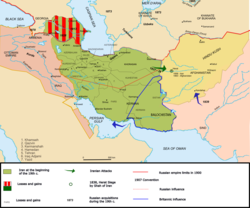Dinasti Qajar
Dinasti Qajar (Qajar ) (basa Pérsia: سلسله قاجاریه - atanapi دودمان قاجار, kawanoh ogé salaku Ghajar atanapi Kadjar) nyaéta hiji kulawargi karajaan Iran tina katurunan Turk[1][4] anu ngawasaan Pérsia (Iran) saprak 1785 nepi ka 1925.[5][6] Kulawargi Qajar nyekel kakawasaan pinuh kana Iran dina 1794, nyingkirkeun Lotf 'Ali Khan, ti Dinasti Zand. Dina 1796, Mohammad Khan Qajar sacara resmi diistrénan minangka shah.[7]
| Nagara Ageung Pérsia دولت علیّه ایران Dowlat-e Eliyye-ye Irân | |||||
| Kakaisaran | |||||
| |||||
| |||||
| Lagu kabangsaan Salâmati-ye Shâh | |||||
 | |||||
| Ibu kota | Tehran | ||||
| Basa | Basa Pérsia (pustaka, administratif, kabudayaan, resmi)[1][2] Basa Turki (basa utama pangadilan)[3] | ||||
| Pamaréntahan | Monarki absolut nepi ka 1906
Monarki konstitusional nepi ka 1925 | ||||
| Shah | |||||
| - 1794-1797 | Mohammad Khan Qajar (first) | ||||
| - 1909-1925 | Ahmad Shah Qajar (last) | ||||
| Perdana Mentri | |||||
| - 1906 | Mirza Nasrullah Khan (first) | ||||
| - 1923-1925 | Reza Pahlavi (last) | ||||
| Sajarah | |||||
| - Mimitina Dinasti Qajar | 1785 | ||||
| - Pajangjian Gulistan | 1813 | ||||
| - Pajangjian Turkmenchay | 1828 | ||||
| - Révolusi Konstitusi | 1906 | ||||
| - Mimitina Dinasti Pahlavi | 1925 | ||||
| Mata uang | Toman | ||||
| Ayeuna bagian ti | |||||
Tingali ogé
édit| Portal Portal Portal Portal |
Rujukan
édit- ↑ a b Homa Katouzian, "State and Society in Iran: The Eclipse of the Qajars and the Emergence of the Pahlavis", Published by I.B.Tauris, 2006. pg 327: "In post-Islamic times, the mother-tongue of Iran's rulers was often Turkic, but Persian was almost invariably the cultural and administrative language"
- ↑ Homa Katouzian, "Iranian history and politics", Published by Routledge, 2003. pg 128: "Indeed, since the formation of the Ghaznavids state in the 10th century until the fall of Qajars at the beginning of the 20th century, most parts of the Iranian cultural regions were ruled by Turkic-speaking dynasties most of the time. At the same time, the official language was Persian, the court literature was in Persian, and most of the chancellors, ministers, and mandarins were Persian speakers of the highest learning and ability"
- ↑ Law, Henry D.G. (1984). "Modern Persian Prose (1920s-1940s)". Di Ricks, Thomas M. Critical perspectives on modern Persian literature. Washington, D.C.: Three Continents Press. p. 132. ISBN 0914478958, 9780914478959 Check
|isbn=value (bantuan).cited in Babak, Vladimir; Vaisman, Demian; Wasserman, Aryeh. "Political Organization in Central Asia and Azerbaijan": During most of the Qajar rule, Turkish was the principal language spoken at the court, while Persian was the predominantly literary language.
- ↑ William Bayne Fisher. Cambridge History of Iran, Cambridge University Press, 1993, p. 344, ISBN 0521200946
- ↑ Abbas Amanat, The Pivot of the Universe: Nasir Al-Din Shah Qajar and the Iranian Monarchy, 1831-1896, I.B.Tauris, pp 2-3; "In the 126 years between the fall of the Safavid state in 1722 and the accession of Nasir al-Din Shah, the Qajars evolved from a shepherd-warrior tribe with strongholds in northern Iran into a Persian dynasty.."
- ↑ Choueiri, Youssef M., A companion to the history of the Middle East, (Blackwell Ltd., 2005), 231,516.
- ↑ Qajar Dynasty on Encyclopædia Britannica
Tumbu kaluar
édit| Wikimedia Commons mibanda média séjénna nu patali jeung Dinasti Qajar . |
Kulawargi Qâjâr Diwangun: 1794 Lungsur tahta: 1925
| ||
| Saméméhna Kulawargi Zand |
Kulawargi pangawasa Iran 1794-1925 |
Sanggeusna Kulawargi Pahlavi |
Citakan:Empires Citakan:Iran topics
| Artikel ngeunaan sajarah Iran ieu mangrupa taratas, perlu disampurnakeun. Upami sadérék uninga langkung paos perkawis ieu, dihaturan kanggo ngalengkepan. |

